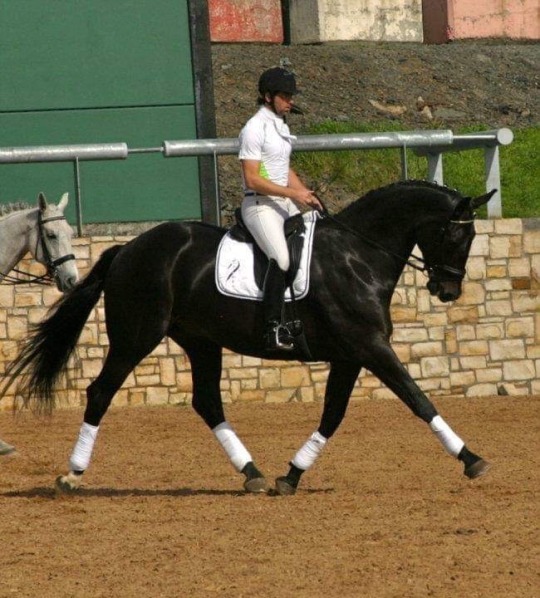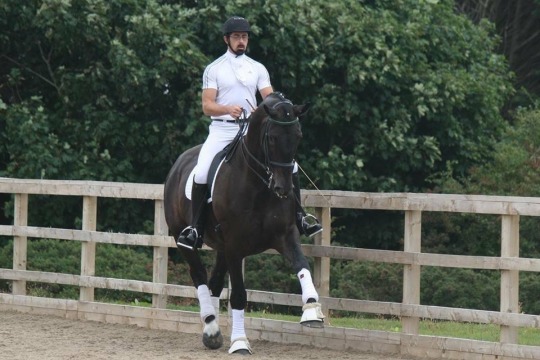Text
http://irishdressage.blogspot.com/2025/06/dare-to-daydream.html?m=1

New Blog!
1 note
·
View note
Text

http://irishdressage.blogspot.com/2025/05/the-one-big-lesson.html?m=1#more
0 notes
Text
Training ethically, is it such a simple idea?. Lately there’s much conversation about the top riders, the top trainers and top breeders. Unpicking the bad practices and who is responsible for it. How do we make sure we’re looking after the industry from our own little corner. Are we exempt from those problems and practices? Can we truly say we’re part of the solution just because that elite level doesn’t touch our lives except as spectators.

Making a life and business with horses, makes you examine it from many angles often revealing uncomfortable things. As a trainer I need enough clients to pay my bills. Not just enough clients but enough returning clients. Amid a rotation I’ve found myself spending energy not teaching a simple ethical system but a tempered version. Defensive by nature or at least damage limiting. Time between lessons teaching resistant riders who’ve chosen to wait till there’s a problem to book a lesson. Time spent breaking down at best the often unconscious resistance while putting a horse back on track. Rather than solely offering information it’s the development of a skill of diplomacy at delivering bad news in a good way. There are so many moments where someone much be halted in their tracks before they compounds a problem, without pissing on their parade. A new client once asked tartly “would you do this with your own horse” and I had to answer no but because I would never let my horse get into such a state. It seems more common now to shoot the messenger and flee to the next trainer who’s willing to tell you something more comfortable so they in turn can put food on the table.
Pushy parents wanting only a win, over zealous riders in competition, riders badgered into “just having fun” saving money and buying a project, For every rider avoiding a problem they make it harder for a trainer to make a living, staying true to their values and have enough to pay their bills.
Are we losing a culture of learning, a respect for taking the time to educate before we launch into doing. How many people budget for lessons when shopping for a horse only to then resent how much they spend on retraining it. How many peoples can no longer find the fun in training but only in competing. The culture of buying a horse for life and committing to whatever it needs seems to be disappearing. Flaws of horse personality or lack of talent being used as justification for poor training. These justifications guarding us from admitting we need more training, on and off the saddle. More money to spend on fun and less money for people working in the industry. Can we really be surprised at why peoples ethics are challenged? I can’t effect how the top riders train, I am however solid in knowing that when they need to change a practice they’re equipped to do it, can we all say the same? I’m most reassured when I know I’ve fought my little corner of the world with each horse and each client, even it it means a sparse table. It’s not just charity that starts at home, so does change.

0 notes
Text
Amongst my endless chattering, I was speaking with a friend recently who works as a healthcare professional. They used the phrase, upstream prevention. Included in the idea is treating the economic and social issues rather than the just the resulting behaviors of individuals.
Do we have a conscious equivalent in the dressage industry? Do we have a forward thinking support system or a more reactionary approach? It seems lately we have lots of people fleeing towards an alternative path. Maybe that’s what is needed but can we afford a complete restart? Being rather suspicious I counsel riders to pause and think, are you doing better or just different. In aid of caution or the public perception of kindness, we try leaping into different and run the risk of reactive thinking. Riders tell me they’re going to take the pressure off or just concentrate on having fun which on re-examination often reveals avoidance of being detailed or lack of knowledge.
Dressage has made me examine how to not react. Check, feel and notice but not blindly react. I don’t always get it right but I’m comforted by the fact I’m searching for it instead of jumping from one pattern to another. If we can sit in the un-reactive phase we might just be able to pluck some threads from both historically tried and tested knowledge and new scientific based information. Use the useful but acknowledge what can be adapted and what needs to be thrown away. In aid of caution or public perception of kindness, in only doing different we risk that exact reactive thinking. Giving ourselves a comfort blanket, congratulating each other at “not being that” or “ being different” rather than examining the underneath. Let’s not apply downstream measures, let’s just do better.

1 note
·
View note
Text
1 note
·
View note
Text




Just some of the photos from the Justine Sole photoshoot!
5 notes
·
View notes
Text
Saying hello to the morning.
6 notes
·
View notes
Text





Little bit of tv time at Dressage at Devon.
0 notes
Text



Prize giving at Burrow Court Dressage, Area Festival prelim and novice winner.

0 notes
Text






Show seasons started well.
19 notes
·
View notes
Text

New Blog post,
0 notes
Text
KICK ON AND LET GO
It’s an easy philosophy isn’t it! I’m not sure its one I’ve been able to live by, Maybe there was a time where I did but I doubt it. Bumping into past trainers removes any of that doubt. Overcautious and overthinking in everything is the consensus.
Somewhere over the years I’ve managed to turn that into a skill and use it not just in my favor but for clients too.Thoughtful considered riding is something I think we need to see more.
But I’m can’t say for sure that I’ve ever taken the notion head on. Watching too many horses to count being trained mindlessly has persuaded me to stay in the zone of overthinking and under achieving at least in a way that meant less chance of screwing up another innocent horse. Pondering for the longest time the prospect of a young horse made me think of how may so called projects have been bought and had their bodies and spirits smushed into a riders ego or fears and made me hesitant.

Then enters new horse and I think I’ve learned enough to have a proper go of it, not letting go of the overthinking but also embracing the kick on and let go. If the right horse finds us, this ones here for a reason. An enormous five year old that has more power and potential than any other horse I’ve owned, so I made myself and him a deal. I have agreed to push my training in the other direction while using what skills I have but with as much support as I can offer myself and my horse. I preface each lesson week with “I might not like it” but I will be obedient and do it. The fear of fucking up may be there but I’ve vowed not to give into it. So far it’s not become instinctual but my reactionary riding is becoming less. Now I’m also learning to breathe!
4 notes
·
View notes
Text
DESCRIPTIVE RIDING
Describing my horse, not his ears, although they are the best ears a horse could every have, despite being told by a lady in the warm up of a show he had ears just like a donkey, but describe him in training terms. Growing up in Ireland we were offered lots of wonderfully lyrical stories about horses, their parents, their uncles and aunts because we do genuinely come from the land of storytellers, for better and worse. One breeder I worked with could tell me the lineage of every horse on the farm and what its half sisters older brother competed in. I’m still none the wiser to whether it cold bend left or not. This kind of describing, as well as brain melting makes it very easy to get stuck in descriptors that are more reflective of our brains rather than their physical training.

I often forget that I love horses for themselves and the riding came secondary and mostly because I needed to demonstrate I could make enough money to put food on the table to my horrified parents. Some said it's been very brave to stick at this profession. I actually think it's more cowardice because it's the only thing I know, it's the relationship that rewards me the most and that includes my relationship with myself.
Yearning to know a horse best and fullest through the riding because often it's the most intimate moment in the dynamic and relationship. On a side note, I believe that because I, as well as many others struggle with human relationships that the rider/horse dynamic is more enticing because it's not two humans. I struggle with humanity often, wondering about things I cannot affect. I can however effect my horses training. Approaching the training from a horse personality point of view leaves me no opening for how I’m going to signal or ask for something. With a perfectionist brain I often end up frozen in fear of making it worse.

At the beginning of every lesson I ask my riders, how has your horse been, this isn’t a cue to tell me how sharp or sassy or quirky he is but that they're lacking in confidence in something and that together we are going to explore what that is. Forcing the phrase my horse is lacking in confidence in shapes a whole new conversation in whether I correct my horse or help my horse. Once we’ve explored the underneath then we can throw around words, sometimes as I’m Irish, they’re often very colourful but everyones on the same page as to what we’re aiming to achieve.
In my first ever training session with Conrad Schumacher I worried I didn’t have enough experience as I didn’t know what he meant with a particular phrase. It turned out it was the same phrase my trainer used with a German accent. I’m getting better at asking, "what did you mean? “
4 notes
·
View notes





